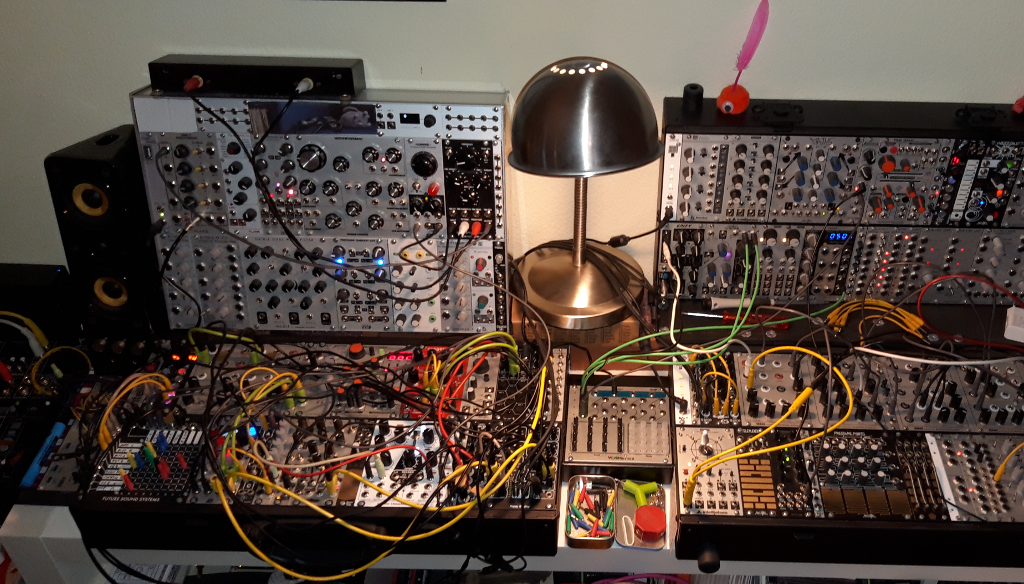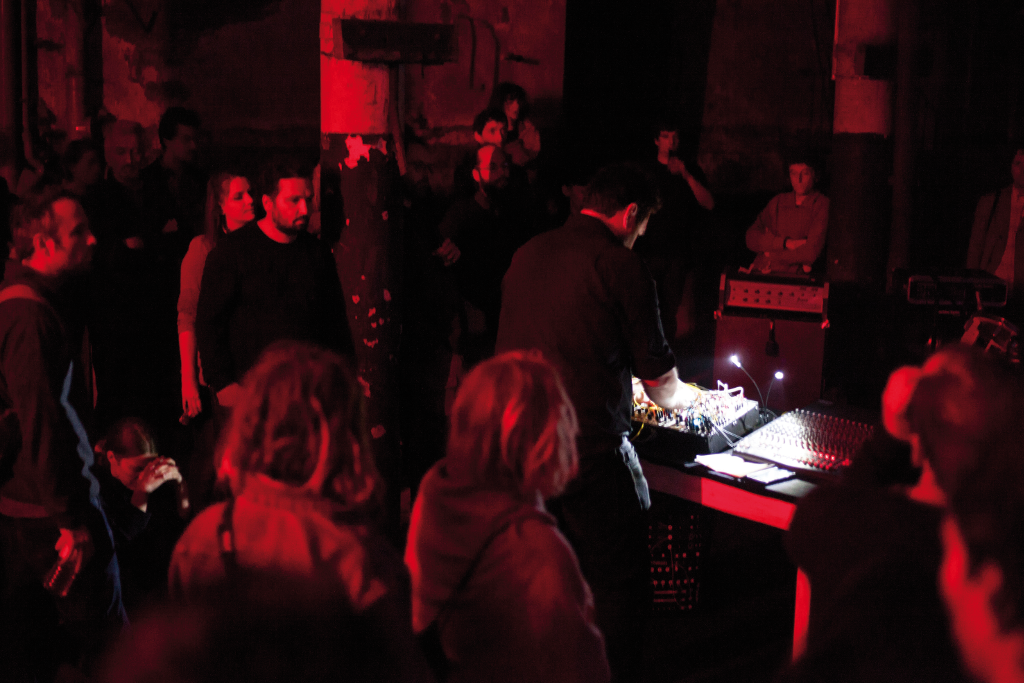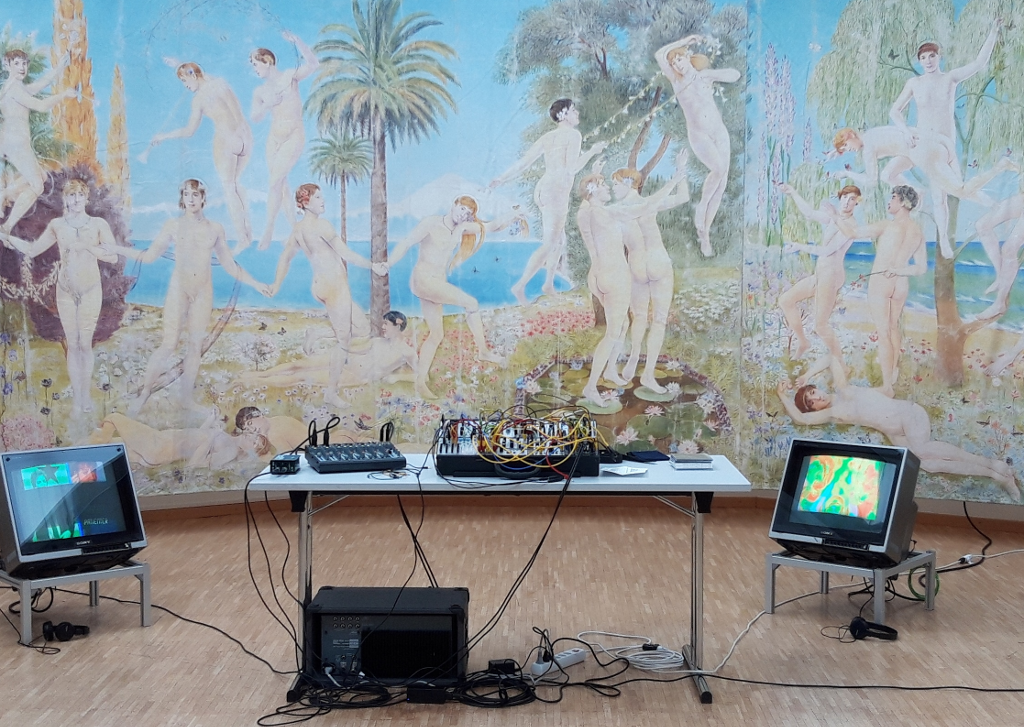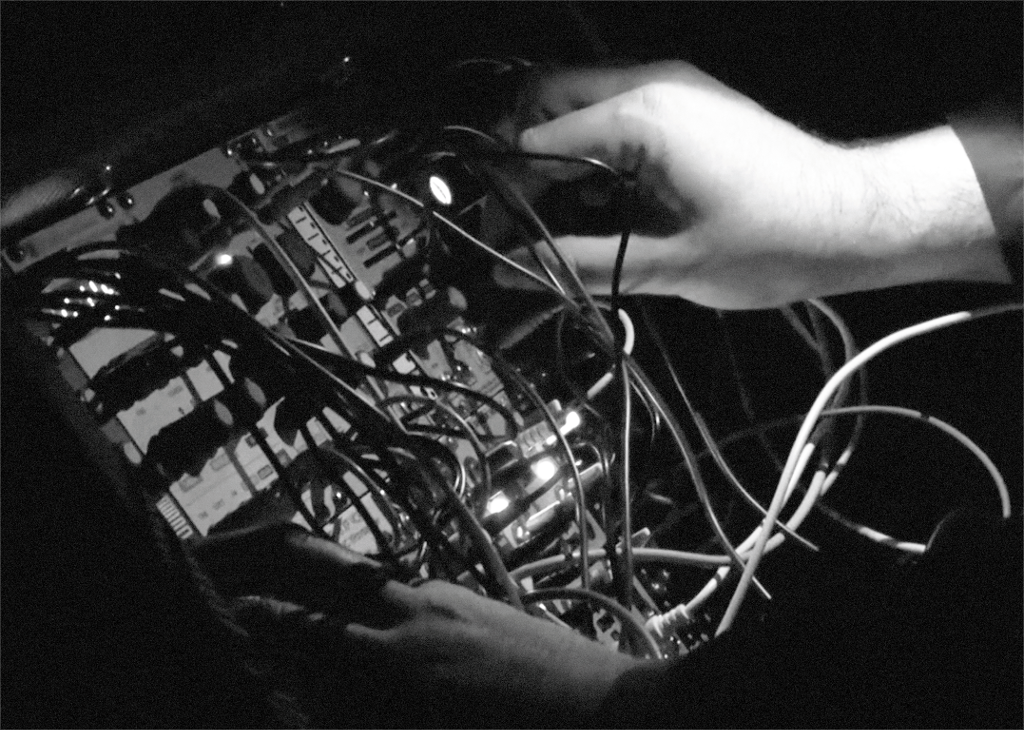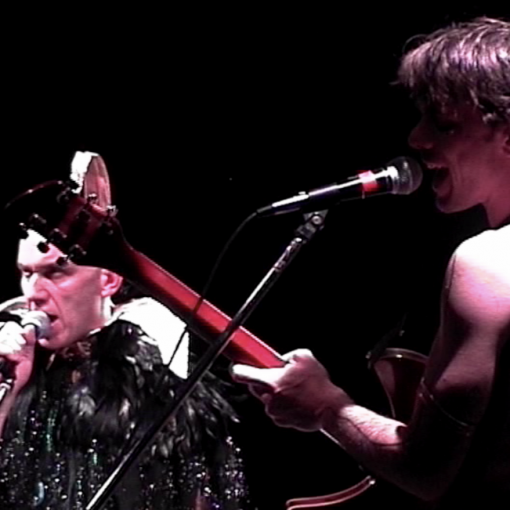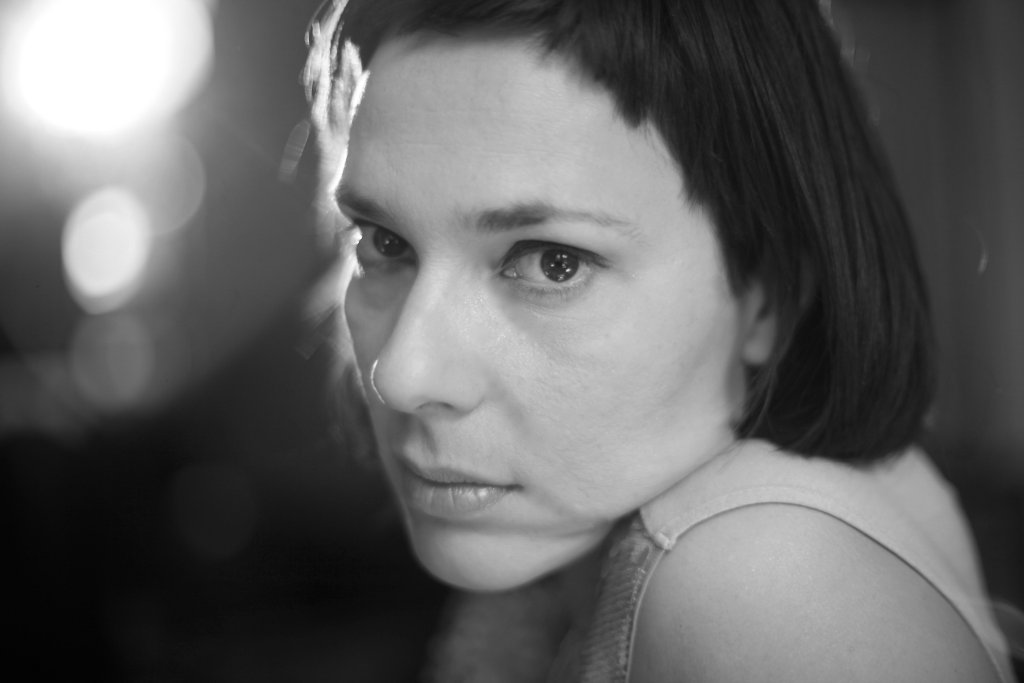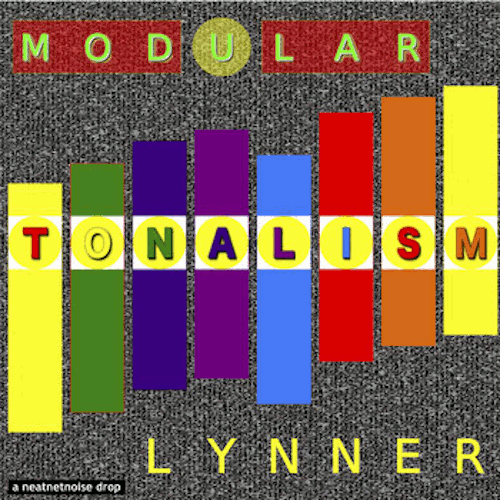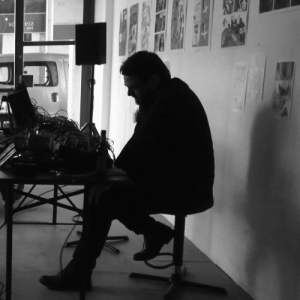 Francisco Meirino (also known as Phroq up to 2009 when creating harsh noise). Using instrumentation including modular synths, reel-to-reel tape recorders and various home-made electronics, he has collaborated with artists such as Leif Elggren, Michael Gendreau and Gerritt Wittmer and also writes for contemporary music ensembles and dance with releases on labels such as The Helen Scarsdale Agency, (who have just released his A New Instability LP) Flag Days and Firework Editions.
Francisco Meirino (also known as Phroq up to 2009 when creating harsh noise). Using instrumentation including modular synths, reel-to-reel tape recorders and various home-made electronics, he has collaborated with artists such as Leif Elggren, Michael Gendreau and Gerritt Wittmer and also writes for contemporary music ensembles and dance with releases on labels such as The Helen Scarsdale Agency, (who have just released his A New Instability LP) Flag Days and Firework Editions.
His session for Philippe Petit‘s Modulisme series runs at just under an hour, and as part of the ongoing cross-collaboration, he spoke to Freq about his background in and thoughts on modular synthesis.
When did you first become aware of modular synthesis as a particular way of making music, whether as part of electronic music in general or more specifically as its own particular format, and what did you think of it at the time?
I guess the first time I really got interested in synthesis was when I was researching the gear that Merzbow was using on his 1990s records. I became curious about that EMS synth he was using on a lot of them. Finding out how expensive it was and how broke I was made me look for other ways to do synthesis. That’s when I got into max/msp and pure data on my computer, as it was cheaper to work with. Most of my works until 2008 where done with various electronics and synthesis through max/msp or puredata.What was your first module or system?
After ten years of working mostly the computer I became (as a lot of people) bored by it and slowly started researching old synth, a friend lend me his vintage Korg MS10 for a year and that was a fantastic machine, the feeling of doing things quickly, I mean patching is so a satisfying experience! When he asked for his synth back I needed something, so I bought the only “patchable” synth I could afford: a MFB Kraftzwerg semi-modular system and a year after a Korg MS20 Mini.
When I was playing shows or composing in my home studio, I was going through various pedals, field recorders, mixers, my semi-modular synths, DIY oscillators, tape recorders etc, so much gear to move and carry! I wanted to have a more convenient system, something lighter that I could carry to shows. It’s only in 2013 that I got a big commission for a dance piece and enough money to start my own eurorack system.How long did it take for you to become accustomed to patching your own synthesizer together out of its component parts?
It took some time, but very quickly my main goal with my eurorack system was to put together something that will replace my computer and all the electronics I use at live shows, I needed a portable machine that could playback and record sounds and modify them (pitch-length-speed, etc) like a sampler and a tape recorder, and also I needed to have several oscillators and the tools to modulate them and some modules to make weird noises… After a couple of years I put together what became my main system and I didn’t really change anything since. I now can patch it very quickly and it’s very easy to patch it for my needs.Of course, that couple of years were done of a lot of trying / buying / selling modules that were great but too big, too small, too limited, too complicated to be incorporated in my « live » system, so all those modules became the rest of what is now a bigger eurorack system that stays in the home studio. I try to only keep modules that I understand, I hate to go « blind » on a module; if it’s too complicated I tend to sell it.
Do you prefer single-maker systems (for example, Buchla, Make Noise, Erica Synths, Roland, etc) or making your own modular synthesizer out of individual components form whatever manufacturer that match your needs.
I like to mix and match whatever I need, but I also really like some systems that are very cleverly put together like the Serge Animal and Soup Kitchen, but for my needs I can’t see what can compare to the flexibility of putting together your own eurorack.East Coast, West Coast or No-Coast (as Make Noise put it)? Or is it all irrelevant to how you approach synthesis?
It’s pretty irrelevant to how I approach synthesis, but if we have to talk about it in those terms, it will be closer to the West Coast synthesis. My way of patching includes a lot of feedback within the modules themselves, sound files modifications and a lot of waveshaping, all done with manual controls, no clock generators, step sequencers or stuff like that, I modulate my sound sources with FM modulation and random voltages. The mixing of all the sources make the pièce in a musique concrète spirit, on my portable system (a 6U / 104 HP) I have a six-channel mixer and a seven-channel pre-mixer.
Do you tend to use pure modular systems, or do you bring in outside effect and devices when playing or recording?
If it’s in a live performance, it will only be the modular system, nothing else. If I am composing a new piece in my home studio, it will be a mix of various stuff; tape echos, tape recorders, acoustic instruments, voices, a lot of field recordings.Do you find that you record straight with no overdubbing, or do you end up multi-tracking and editing tracks in post-production?
Always multi-tracking and edition in post-production.
Do you pre-patch your system when playing live, or do you tend to improvise on the spot?
Parts of my live system is pre-patched, especially the parts that never change (all the settings for mixing in quadrophonic, all the triggers for the envelopes etc), but for every live set, there is about 50 % pre-patched and 50 % of improvisation; as I said before, I built my live system to be as flexible as possible for my music.I need the synth to make my music not its music. I use a modular synth because I was able to finally build a machine that will sound like I want, that will extend and emulate my sonic pallette. I dislike modules that have too much “personality”.
Which module could you not do without, or which module do you you use the most in every patch?
Wow, that’s a hard question, but well, I guess it’s not very “sexy”, but I couldn’t do anything without my Happy Nerding Pan Mix, it’s the heart of the system, for VCAs and auto-pan effects, but if we wanna talk about a more exciting module, I guess it will be the 4MS Stereo Triggered Sample. I use it in every live set and patch I do.What do you think that can only be achieved by modular synthesis that other forms of electronic music cannot or makes harder to do?
To make very quick connections with no need to go through a menu, and also the amazing flexibility of being able to make feedback connections with most of the modules; this machine unfolds your creativity in a very simple way.
Have you used various forms of software modular (eg Reaktor Blocks, Softube Modular, VCVRack) or digital hardware with modular software editors (eg Nord Modular, Axoloti, Organelle), and if so what do you think of them?
I used a lot max/msp and puredata; both are open systems, both are patch-based architectures, so except for those two, I never used modular synth software. And I never used digital hardware either. I’m not interested in them, .What module or system you wish you had?
I wish I had a Serge 4U system, and I’d love to own a Verbos Bark Filter Processor.Have you ever built a DIY module, or would you consider doing so?
No, I am terrible with a soldering iron.
Which modular artist has influenced you the most in your own music?
They are not strictly “modular” artists, but electronic pieces of Tod Dockstader, Bernard Parmegiani and David Tudor really had a big influence on me, and more recently I love the works of Jean-Philippe Gross, Thomas Ankersmit and Yvan Etienne.
Can you hear the sound of individual modules when listening to music since you’ve been part of the modular world — how has it affected (or not) the way that you listen to music?
Yes I can with some trends; some modules are easily recognizable; I don’t like that, and because of that, I have some modules that I barely use, even if most of them sound great; they have too much “personality” to fit in my sonic palette, it’s very important for me to that my music defines the sounds of the modules and not the other way.What have you been working on lately, and do you have any upcoming releases or performances?
I’ve been working on a re-issue boxset of my four solo albums on the US label Misanthropic Agenda, and I’m currently working on a new piece The Imitation Of An Action for ensemble and modular synth; the basic idea is to make the acoustic instruments (violin, cello, piano, percussion, bass clarinet) emulate the electronic sounds I do with my synth.Can you outline how you patched and performed your Modulisme session?
The patch features a lot of oscillators (each with waveshaping possibilities), random voltage unit, two dual envelope generators / oscillators / LFOs, a quad envelope generator, three stereo samplers, a 4×4 matrix VCA / mixer, one effect module, one pre-amp module, one controller module and two modules combined to create a thirteen channel mixer / auto-pan / VCA.
The patch is improvised; I used a lot of FM modulation with my oscillators and random values for the waveshaping, I usually trig the samplers manually with different envelopes on the left and right channels; it helps me to create a huge stereo spread. I also use the dual envelope generators (one Maths and one Serge DUSG) as oscillators that I feed with LFO (in the audible range) and white noise.
I do a lot by hand; I don’t have a sequencer and most of the value changes are done manually.Who would your dream collaborator be for a Modulisme session or otherwise?
That will be André Stordeur, but it will stay a dream as he sadly passed away last year.
*
- Modulisme session
- Website
- Bandcamp
- Soundcloud
- YouTube
